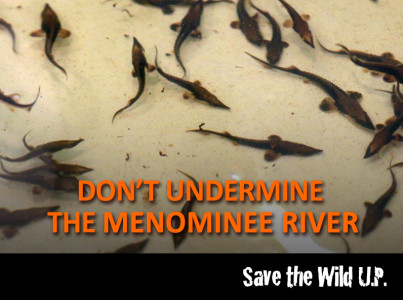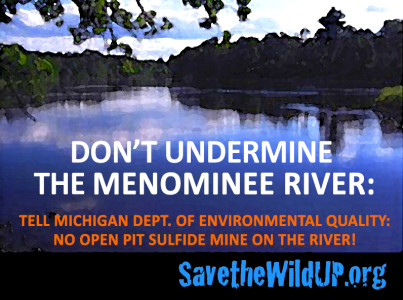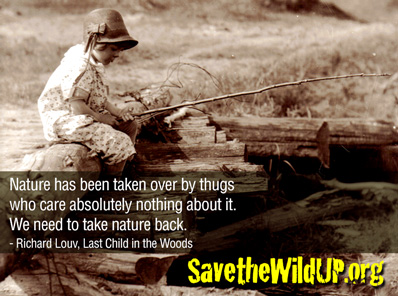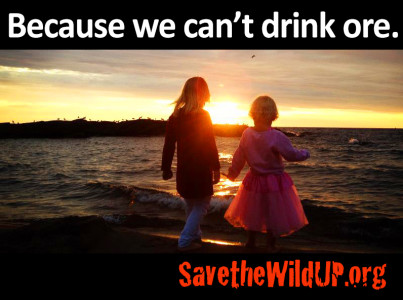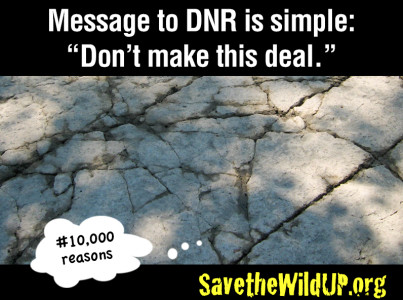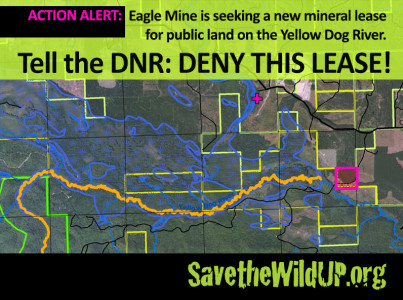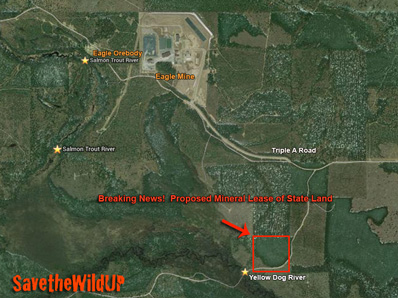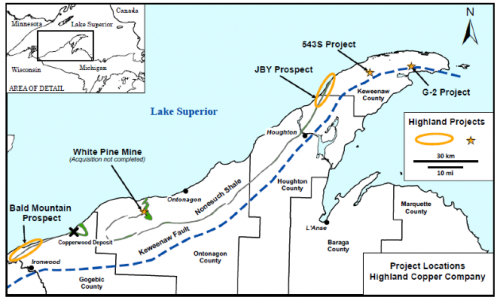MARQUETTE, MI – Regional environmental groups are celebrating the news that a disputed Wetlands Permit for Aquila Resources’ Back Forty sulfide mine has been denied by a Michigan Administrative Law Judge, concluding a two year review of the contested case. The Michigan Department of Environmental Quality (now the Department of Environment, Great Lakes, and Energy) sparked controversy when it approved Aquila’s Wetlands Permit in 2018, over the objections of regulatory staff who were prepared to deny the permit.
The permit was contested by multiple petitioners, including an adjacent landowner, the Menominee Indian Tribe of Wisconsin, represented by Earthjustice attorneys, and the grassroots Coalition to SAVE the Menominee River. According to Earthjustice attorney Janette Brimmer, Aquila “refused to provide all of the information the state needed to determine the full environmental impacts the mine will have on the Menominee River and the surrounding area.”
AQUILA BACK FORTY PROJECT OVERVIEW
The Back Forty project proposes to excavate an enormous 84 acre open-pit mine, 800 foot deep, on the banks of the Menominee River, 150 feet from the water. The mine site would be approximately 1100 acres in size, of which 280-300 acres is public land, part of the Escanaba State Forest. Most of the mine site would be covered by waste rock, ore storage, milling facilities and tailings storage. Nearly all of the Back Forty rock is reactive – capable of producing Acid Mine Drainage (AMD) when exposed to air and water. AMD pollution devastates watersheds and lasts hundreds of years. Tailings and waste rock will be stored on-site during mining; tailings waste will remain on the surface forever. During closure, the open pit mine will be backfilled with waste material. Once this takes place, groundwater contaminated with AMD is predicted to seep into the river. Environmental groups claim that the Back Forty’s environmental impacts could be significantly reduced by using feasible, common-sense alternatives.
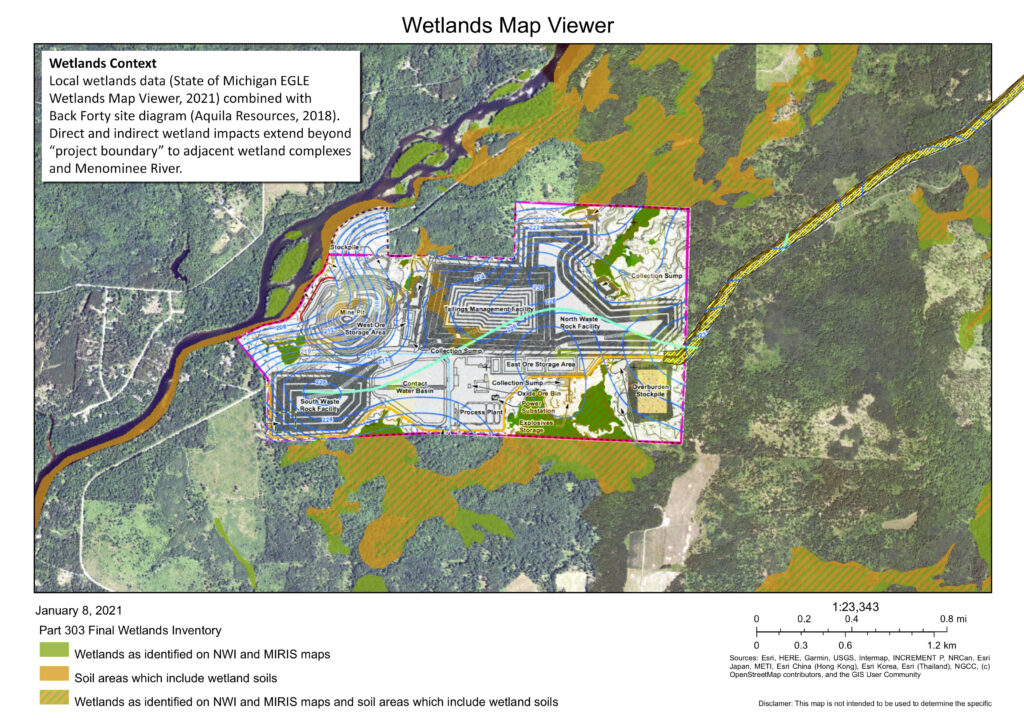
Local wetlands data (State of Michigan Wetlands Map Viewer, 2021) combined with Back Forty site diagram (Aquila Resources, 2018). Direct and indirect wetland impacts extend beyond the project boundary to adjacent wetland complexes, and the Menominee River.
BACK FORTY WETLANDS PERMIT DISPUTE
The permit would have allowed Aquila Resources to destroy wetlands of the Menominee River watershed in order to construct and operate an open-pit sulfide mine, waste storage dam, and mill. Wetland impacts included direct and indirect losses due to excavation, placing of fill, or building parts of the facility on top of wetlands, removing groundwater, permanently changing hydrology, impairing wetland ecosystems, and contaminating the surrounding watershed with toxic dust from mining operations, and acid-mine drainage.
FINDINGS OF FACT AND CONCLUSIONS OF LAW
Judge Pulter’s decision makes it clear that Aquila Resources’ application was not simply flawed, but incompetent:
“In many cases addressing feasible and prudent alternatives, the applicant’s initial site plan has the most impact to the resource. During the processing of the application, it is common for the applicant to reduce the amount of wetland impacts sought in its original site plan. (…) In this case, however, the amount of wetland impacts increased with each modification of Aquila’s site plan. Aquila did not proffer evidence of how it had re-designed its site plans with a view toward reducing wetland impacts. (…) Because it considered three site plans, each of which increased in wetland impacts, the record does not contain evidence of feasible and prudent alternative locations and methods. Therefore, I find, as a Matter of Fact, that Aquila failed to demonstrate that there are no feasible and prudent alternative locations or methods.”
Wetlands are strictly protected under state and federal law. Before wetlands can be destroyed, Aquila must demonstrate that the impacts are unavoidable. The applicant failed that test, and so Judge Pulter concluded that Aquila’s Wetland Permit must be denied:
- “Aquila failed to demonstrate that there are no feasible and prudent alternative locations and methods because it did not proffer evidence of how it had re-designed its site plans with a view toward reducing wetland impacts.”
- “The proposed project will have a probable negative effect on historic, cultural, scenic, and ecological values.”
- “The proposed project is not in the public interest.”
- “Aquila failed to demonstrate that the disruption to the aquatic resources caused by proposed activity will be acceptable.”
- “The proposed activity is not wetland dependent.”
- “Aquila failed to demonstrate that a feasible and prudent alternative does not exist.”
- “Therefore, Aquila is not entitled to a permit in this case.”
MEDIA STATEMENTS
Dale Burie, president of the Coalition to SAVE the Menominee River:
According to Davis & Kuelthau attorney Ted A. Warpinski, who represented the Coalition, “Judge Pulter issued a thorough and thoughtful decision recognizing the many flaws with Aquila’s wetlands permit application and rejecting the attempt by EGLE to correct those flaws with improper permit conditions. We are grateful for the cooperative efforts of the Earthjustice attorneys representing the Menominee Tribe as well as the diligent efforts of Mr. Boerner who joined us in challenging this wetland permit.” We encourage Aquila to accept that this is simply not a suitable location for a mining operation.
Al Gedicks, executive secretary of the Wisconsin Resources Protection Council:
Judge Pulter’s careful consideration of the scientific testimony in the contested wetlands case reveals a consistent pattern of Aquila’s manipulation of scientific research to conceal significant negative impacts to wetlands from the proposed Back Forty mine. Ms. Kristi Wilson, an environmental quality specialist from EGLE’s Water Resources Division (WRD) testified that Aquila failed to provide information requested by the WRD regarding dewatering of the open pit and its effects on wetlands within the project area. Without this information the WRD could not evaluate the impact to wetlands. Mr. Eric Chatterson, a geology specialist from the WRD, testified that Aquila “predetermined what was going to happen and it just manipulated the mathematics to make that happen.” The end result was a fraudulent application that prevented the public from recognizing the full extent of the harm to wetlands from this project. Aquila’s conduct in this case is ethically reprehensible.
Guy Reiter, executive director of Menikanaehkem:
Menikanaehkem applauds Judge Pulter’s decision, in denying this wetland permit. Menikanaehkem has always been a strong defender of our beautiful Menominee river and our vast Menominee cultural resources located around the river.
Ron Henriksen, spokesperson for the Front 40 Environmental Fight:
We are so appreciative of the hard work by individuals, tribes, and environmental organizations which helped the judge reach this important decision. Front 40 Environmental Fight was founded in 2003 to help defend the Menominee River and Shakey Lakes from the hazards of sulfide mining; for the past 17 years, we have informed the public about the dangers of sulfide mining through education and outreach — and the community responded overwhelmingly, rejecting Aquila’s dangerous Back Forty mine! We thank everyone who is working to protect our wetlands, and the Menominee River.
Kathleen Heideman, member of the Mining Action Group:
This decision is a thoughtful, clear-eyed rebuke of Aquila Resources. Aquila’s approach to permiting the Back Forty project has been hasty and incompetent, and reveals a disregard for Michigan’s natural resources. The decision demonstrates that the Wetland Permit was subject to denial for dozens of reasons — critical data was never provided to regulators, hydrological modeling was unsupported, and statutory requirements were not met. Most critically, Aquila failed to undertake any meaningful review of the feasible alternatives, in order to minimize the impacts to wetlands, or avoid wetlands altogether.
Horst Schmidt, president of the Upper Peninsula Environmental Coalition:
This is great news for the people of Wisconsin and Michigan. Aquila’s inability to submit a permit without major deficiencies reinforces our concern that this company is unable to meet the minimum standards for developing a safe mining operation. It’s a shame people must waste their time for years fighting to keep the State of Michigan from approving a mine that threatens one of the Great Lake’s best sports fishing habitats, even as Michigan and Wisconsin nonprofits and environmental agencies work jointly to restore sturgeon habitat in the Menominee River. I congratulate the Administrative Law Judge on this wise environmental ruling.
Carl Lindquist, executive director of the Superior Watershed Partnership and Land Conservancy
We applaud the decision to deny this permit. We’ve worked with eight Native American tribes and other stakeholders to list the Menominee among American Rivers’ Top Ten Most Endangered Rivers in the United States. We are convinced that Aquila’s open pit mine is too risky. In addition to exposing sulfide based ore, the mining process would use cyanide and other toxins, a stone’s throw from one of the largest tributaries to Lake Michigan. The risks to wetlands, groundwater, surface water, the Great Lakes and the cultural legacy of the Menominee Indian Tribe are simply too great.
SUPPORT
Independent review of the Aquila Back Forty Wetland permit was made possible by the generous support of groups and individuals concerned about the future health of the Menominee River. Working collaboratively, the Mining Action Group of the Upper Peninsula Environmental Coalition and the Front 40 secured grants and donations from Freshwater Future, Superior Watershed Partnership, the Western Mining Action Network, DuPage Rivers Fly Tyers (DRiFT), Northern Illinois Fly Tyers (NIFT), Badger Fly Fishers, M&M Great Lakes Sport Fisherman, Wisconsin Smallmouth Alliance, Fly Fishers International, Great Lakes Council of Fly Fishers International, the Emerick Family Fund, and from many individual fishing enthusiasts throughout the Great Lakes area.
KEY LINKS
- January 4, 2021, Contested Case Decision and Order
- Urban Milwaukee: Murphy’s Law: Flip-Flop on Mine Threatens State Waters
- Detroit Free Press “Upper Peninsula mine approved despite major concerns from DEQ and EPA staff, records show”
- June 6, 2018, “Why was Aquila’s Wetland Permit Issued?”
JOIN THE CONVERSATION!
Join UPEC’s upcoming Livestream Event “A WIN FOR WETLANDS” to learn more about this important environmental legal decision. “A WIN FOR WETLANDS” will offer a panel discussion featuring Al Gedicks of the Wisconsin Resources Protection Council, Dale Burie of the Coalition to Save the Menominee, Guy Reiter of Menikanaehkem, and Kathleen Heideman of the Mining Action Group. The event will take place on Thursday, January 14, 2020, at 7 pm EST, livestreamed via Facebook and Zoom. Connect using these links:
Join Facebook Livetream
https://www.facebook.com/Upper-Peninsula-Environmental-Coalition-195291337192049/live_videos
Join Zoom Meeting
https://us02web.zoom.us/j/83113438020?pwd=d3pZcjNyYW9uVmZUTy9vc2ZIN0UwUT09
Meeting ID: 831 1343 8020
Passcode: 2021
One tap mobile
+12532158782,,83113438020#,,,,*2021# US (Tacoma)
+13017158592,,83113438020#,,,,*2021# US (Washington D.C)
# # #
Coalition to SAVE the Menominee
President Dale Burie, (615) 512-3506
The Coalition’s mission is to protect the water quality of the Menominee River for generations to come and ensure clean water for the two municipalities that draw their water supply from the mouth of the Menominee River. jointherivercoalition.org
Front 40 Environmental Group
Spokesperson Ron Henriksen, frontforty2016@aol.com
The Front 40 grassroots organization formed in response to the threat of a metallic mineral mine on the Menominee River. Since 2003, their primary objective has been to ensure that metallic sulfide mining operations are not allowed to adversely impact our rivers, lakes, groundwater and lands. menomineeriver.com
Menīkānaehkem
Guy Reiter, (715) 853-2776
Menīkānaehkem is a grassroots community organization based on the Menominee Reservation in Northeast Wisconsin working to revitalize our communities.
Mining Action Group
Kathleen Heideman, info@savethewildup.org
The Mining Action Group, formerly Save the Wild UP, was founded in 2004 to defend the clean water and wild places of Michigan’s Upper Peninsula from the dangers of sulfide mining.
Superior Watershed Partnership
Executive Director Carl Lindquist, (906) 228-6095
The Superior Watershed Partnership is an award winning Great Lakes nonprofit organization that has set records for pollution prevention and implements innovative, science-based programs that achieves documented, measurable results. SWP is a leader in watershed protection for the Lake Superior Basin and the headwaters region of the Great Lakes ecosystem.
Upper Peninsula Environmental Coalition
UPEC Coordinator Dave Harmon, upec@upenvironment.org
Founded in 1976, the Upper Peninsula Environmental Coalition’s purpose remains unchanged: to protect and maintain the unique environmental qualities of the Upper Peninsula of Michigan by educating the public and acting as a watchdog to industry and government. UPEC is a nonprofit, registered 501(c)(3) organization. UPenvironment.org
Wisconsin Resources Protection Council
Executive Secretary Al Gedicks, (608) 784-4399
The Wisconsin Resources Protection Council was founded in 1982 to help counter the lack of information about the effects of large-scale metallic sulfide mining on our state’s precious water supplies, on the tourism and dairy industries, and upon the many Native American communities that are located near potential mine sites.


